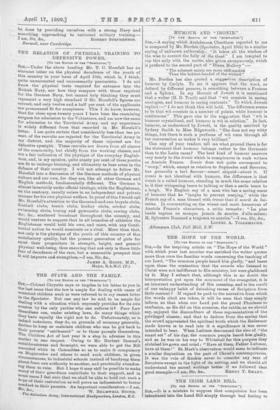THE HOPE OF THE WORLD.
(To TRH EDITOR OF TILE " SPECTATOR."
Sin,—In the inspiring article on "The Hope of the World" with which your last number was enriched the writer quotes more than once the familiar words concerning the teaching of our Lord, "The common people heard him gladly, "and bases upon them the contention that the orowde who listened to Christ were not indifferent to His ministry, but were gladdened by it. May I submit that, although this is no doubt the interpretation put upon the comment of the evangelist, it is an incorrect understanding of His meaning, and is the result of our unhappy habit of detaching verses of Scripture from their context? If regard be paid to the narrative from which the words cited are taken, it will be seen that they simply inform us that when our Lord put the proud Pharisees to confusion, as He did on this occasion, the rabble, as we should say, enjoyed the discomfiture of these representatives of the privileged classes ; and that to deduce from the saying that the crowd appreciated the spiritual truth which tbe Redeemer made known is to read into it a significance it was never intended to bear. When Latimer denounced the sins of "the smart set" of his day, the common people heard law gladly, and as he was on his way to Whitehall for thug purpose they clutched his gown and cried ; "Have at them, Father Latimer, have at them I" St. Mark'e observation would seem to indicate a similar disposition on the part of Christ's contemporaries. It was blue rule of Ruskin never to consider any text of Scripture except in the light of its setting, and we should all understand the sacred writings better if we followed that good example.-1 am, Sir, &a, HENRY T. SMART.






































 Previous page
Previous page